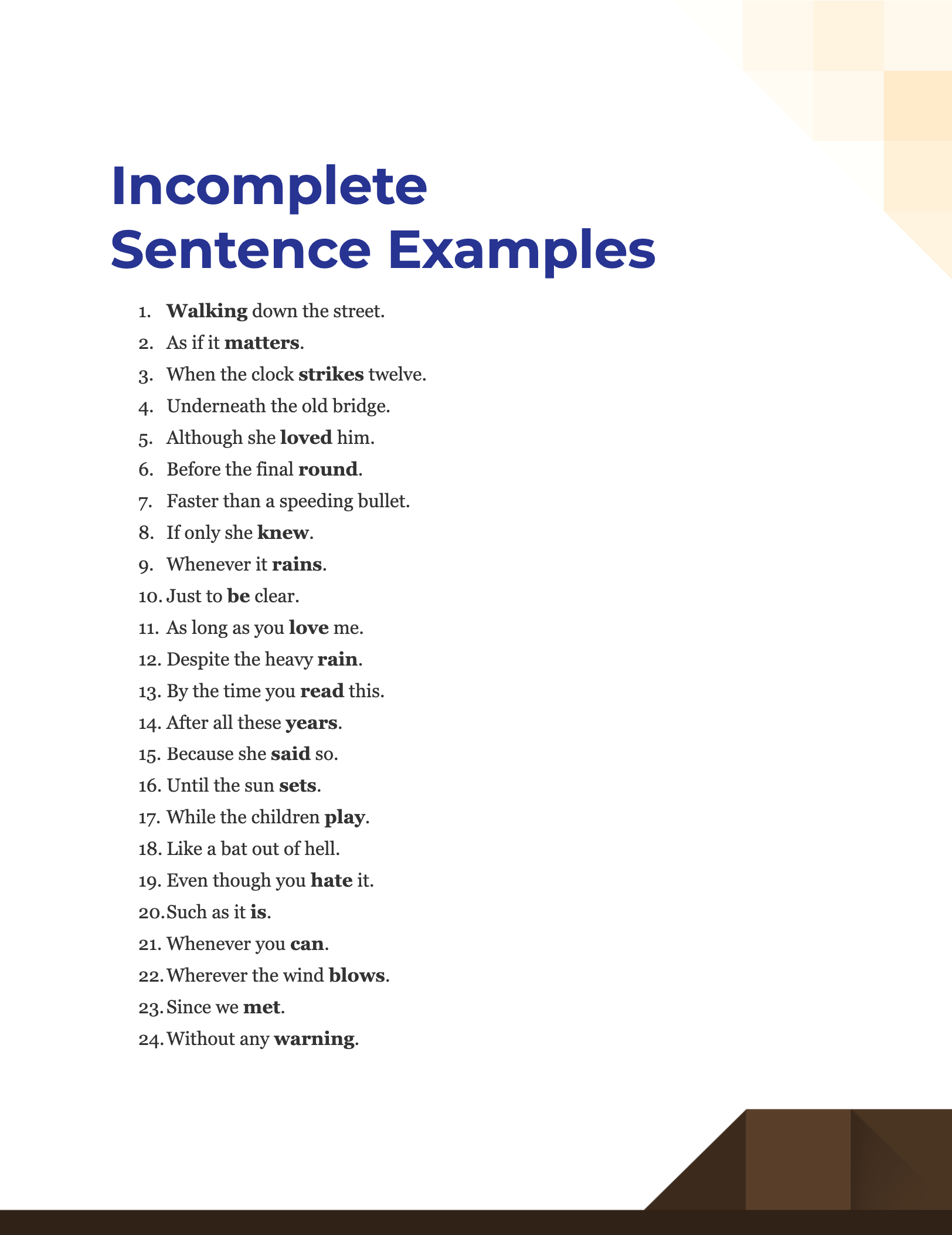99+ Incomplete Sentence Examples
Explore the intriguing world of incomplete sentences with our comprehensive guide. Learn how to craft incomplete sentences that add flavor to your writing, understand their structure, and dive deep into remarkable sentence examples. Perfect for writers, educators, and grammar enthusiasts looking to up their game.
What is an Incomplete Sentence? – Definition
An incomplete sentence, commonly known as a sentence fragment, is a string of words that fails to meet the grammatical criteria of a complete sentence. In other words, it lacks a subject, a verb, or a complete thought, making it incomplete.
What is the Best Example of an Incomplete Sentence?
A standout example of an incomplete sentence is: “Without a doubt.” This sentence fragment lacks both a subject and a verb, making it incomplete. However, in the context of speech or artistic writing, it can serve to emphasize a point or create a sense of urgency or emotion.
100 Incomplete Sentence Usage Examples

Delve into a rich collection of 100 distinct incomplete sentence examples that can make your writing more dynamic. Whether it’s adding emotional depth or giving your text a conversational tone, these examples are an invaluable resource for anyone wanting to master the art of incomplete sentences.
- Walking down the street.
- As if it matters.
- When the clock strikes twelve.
- Underneath the old bridge.
- Although she loved him.
- Before the final round.
- Faster than a speeding bullet.
- If only she knew.
- Whenever it rains.
- Just to be clear.
- As long as you love me.
- Despite the heavy rain.
- By the time you read this.
- After all these years.
- Because she said so.
- Until the sun sets.
- While the children play.
- Like a bat out of hell.
- Even though you hate it.
- Such as it is.
- Whenever you can.
- Wherever the wind blows.
- Since we met.
- Without any warning.
- Just when you thought.
- Unless you tell me.
- During the thunderstorm.
- On the other hand.
- Beyond the horizon.
- After the storm passes.
- For what it’s worth.
- As soon as possible.
- If you insist.
- When the time comes.
- Although we tried.
- Whoever said that.
- Beneath the surface.
- Where it hurts.
- Rather than waste time.
- However you like.
- Even if it kills me.
- Just because you can.
- Above all else.
- Despite your best efforts.
- As much as I hate to admit it.
- Before it’s too late.
- In case you forget.
- Whether you like it or not.
- If it weren’t for you.
- Whenever you’re ready.
- By the time you realize.
- Even when you leave.
- When the rain stops.
- That is the question.
- Beyond our control.
- On the day you leave.
- Once you know.
- Just like that.
- Whether or not you come.
- Where the heart is.
- As good as new.
- In the event that you call.
- Like there’s no tomorrow.
- When the snow falls.
- Assuming you are correct.
- Until you find out.
- Wherever you go.
- However it ends.
- Since you asked.
- Beside the point.
- After you leave.
- For the sake of argument.
- Just in case you wonder.
- Even as we speak.
- While we wait.
- As far as you know.
- Because I love you.
- Wherever you are.
- As quickly as possible.
- By the way.
- Even though it hurts.
- So that you know.
- Whenever it suits you.
- In case of emergency.
- Where the river bends.
- Until the cows come home.
- After all is said and done.
- For better or worse.
- Unless you know.
- Where you belong.
- In spite of everything.
- Whenever I see you.
- Like a rolling stone.
- Until it happens.
- After the sun sets.
- Whenever you wish.
- Because it matters.
- In order to succeed.
- Just when you least expect it.
- Wherever it leads.
Incomplete Sentence Examples for Class 4
Explore age-appropriate, classroom-tested incomplete sentence examples designed specifically for 4th graders. Perfect for language arts and grammar lessons.
- Even though she is.
- Across the wide field.
- Under the tall tree.
- While you were.
- Like a soaring bird.
- Before the big test.
- When they come.
- During the long break.
- After you finish.
- Because the teacher says.
Incomplete Sentence Exercises for Kids
Engage young minds with dynamic, hands-on incomplete sentence exercises. Kid-friendly approach to mastering sentence structure.
- In the dark room.
- When you feel happy.
- Although it rains.
- If you want to.
- Beyond the blue sky.
- Unless it’s finished.
- As the clock ticks.
- Before you go to bed.
- After the bell rings.
- Wherever the wind takes you.
These examples and exercises are geared towards educating and engaging young learners in understanding the concept of incomplete sentences.
What is a Complete or Incomplete Sentence?
A complete sentence is a group of words that contains a subject and a predicate, and it must express a complete thought. Simply put, it must tell us what it is about (subject) and what it is doing (predicate). For example, “She sings” is a complete sentence because it has a subject, “she,” and a predicate, “sings,” and it conveys a complete thought.
An incomplete sentence, on the other hand, lacks one or more of these elements and does not express a full idea. It leaves the reader with questions like, “What happened?” or “Who did what?” Incomplete sentences are often called sentence fragments. For example, “While she sings” is an incomplete sentence because it leaves us wondering what happens while she is singing.
What is an Example of a Fragment Sentence?
A fragment sentence is essentially an incomplete sentence that is punctuated as if it were complete. Fragment sentences often appear in casual conversations or informal writing and may lack either the subject, predicate, or both. These fragments usually arise from breaking off a small portion of a complete sentence.
Examples:
- Running through the field. (Missing subject and verb)
- Although he tried. (Missing main clause)
- Just incredible! (Missing subject and verb)
- Which is why. (Missing main clause)
Fragments are generally considered errors in formal writing, but they can be effectively used in literary works, advertisements, or casual speech for emphasis or dramatic effect.
What is an Incomplete Thought Sentence Examples?
An incomplete thought sentence is a type of incomplete sentence that leaves the reader questioning what was intended. It lacks enough information to stand alone as a complete thought. Often, these sentences may begin with subordinating conjunctions like ‘although,’ ‘because,’ ‘while,’ or ‘when,’ but they don’t have a main clause to complete the thought.
Examples:
- Even though he was late.
- Unless you know the answer.
- After the final bell.
- While reading the book.
- As she was.
These examples of incomplete thought sentences leave you hanging, compelling you to seek more information for a complete understanding of the context or action. Use them sparingly and intentionally in your writing for added suspense or emphasis.
Armed with these definitions, examples, and insights, you can now easily distinguish between complete and incomplete sentences and thoughtfully integrate sentence fragments to make your writing more impactful.
How do you write Incomplete Sentences? – Step by Step Guide
Writing incomplete sentences, or sentence fragments, is generally discouraged in formal writing. However, these can be used strategically for stylistic reasons or to convey a specific tone or rhythm. Here’s a step-by-step guide on how to write incomplete sentences effectively:
- Identify the Purpose: Before you start, determine why you want to use an incomplete sentence. Is it for emphasis, rhythm, or to mimic conversational tone?
- Choose the Fragment Type: Decide if your fragment will lack a subject, a predicate, or both. Each type gives a different impact.
- Context Matters: Ensure that your incomplete sentence is surrounded by enough context to make the meaning clear to the reader.
- Start Small: Begin with just a few words that capture the essence of what you’re trying to convey.
- Review and Revise: Always read the sentence within the context of surrounding sentences to ensure it makes sense and adds value to your piece.
- Punctuation: Although it’s a fragment, punctuating it correctly is crucial. Incomplete sentences can end with a period, an exclamation mark for emphasis, or a question mark if the fragment is phrased as a question.
- Test for Effect: Read your piece aloud to check if the fragment adds to the desired tone or emphasis. Adjust as necessary.
Tips for Using Incomplete Sentences
- Add Drama or Suspense: Incomplete sentences can heighten tension in storytelling by leaving the reader hanging, urging them to read on for context.
- Emphasize Points: In journalistic or persuasive writing, incomplete sentences can emphasize a point strongly.
- Mimic Real Conversation: In dialogues or first-person narratives, using sentence fragments can make the language sound more natural and relatable.
- Strategic Placement: Always place the incomplete sentence where it would have the most impact. Typically, this would be at the beginning or end of a paragraph.
- Less is More: Don’t overuse incomplete sentences. Too many can make your writing confusing or hard to follow.
- Cohesion: Make sure that your incomplete sentences blend well with the surrounding text and do not stick out awkwardly.
- Quality Over Quantity: One well-placed fragment can have more impact than several poorly placed ones. Choose wisely.
- Compliance with Style Guide: If you’re writing for a publication, ensure that the use of incomplete sentences is in line with their style guide.
By following these steps and tips, you can effectively use incomplete sentences to enrich your writing style, add emphasis, or to convey a specific tone or mood.



